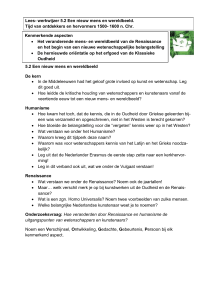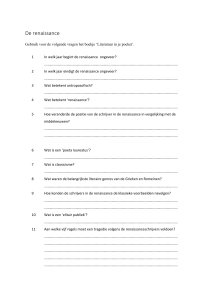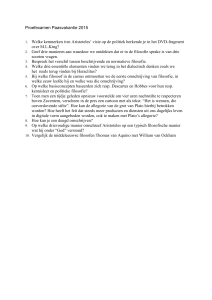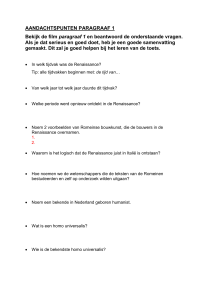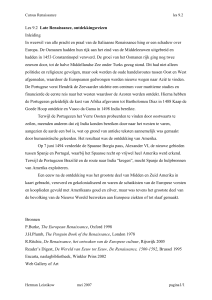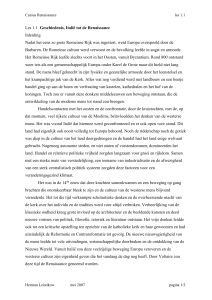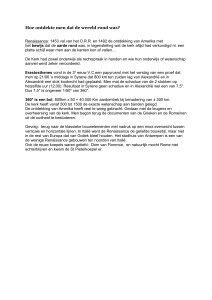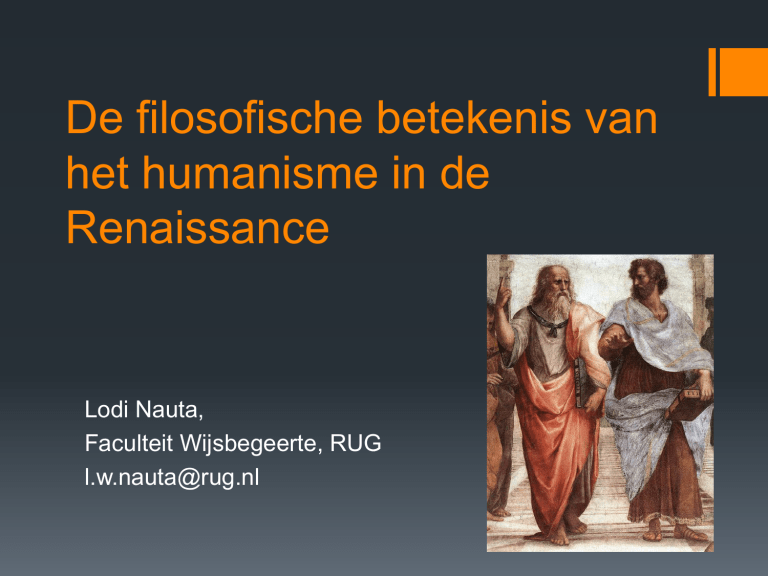
De filosofische betekenis van
het humanisme in de
Renaissance
Lodi Nauta,
Faculteit Wijsbegeerte, RUG
l.w.nauta@rug.nl
2
Rome – de gelaagde stad
oudheid
renaissance
moderne stad
Basiliek San Clemente
3
Rome in de Renaissance
Renaissance: caput mundi
kerkelijk
schisma voorbij: instauratio Ecclesiae Romanae
centralisatie
politiek
kerk als Imperium, paus princeps
Romeinse rijk respublica Christiana
cultureel
herontdekking klassieke oudheid
klassieke bronnen (literatuur, filosofie, wetenschap, retorica, etc.)
kunsten, architectuur
4
‘Romanisering’ via typologie
typus/figura
antiypus
Oudheid (heidens)
helden
Renaissance
Bijbel
- bijv. Mozes
- Petrus
- bijv. Jeruzalem
Renaissance
Paus
Paus
Rome
- binnen bijbel OT NT
5
Kritiek
‘the papacy is no other than
the ghost of the deceased
Roman Empire, sitting
crowned upon the grave
thereof: for so did the
papacy start up on a
sudden out of the ruins of
that heathen power’
(Thomas Hobbes,
Leviathan, 1651)
6
Middeleeuwen/Renaissance
Aristotelisme
scholastieke methode
univ. curriculum
logica
metafysica
wereldbeeld
7
Renaissance
probleem van periodisering, beter 1300-1700
continuiteit: univ., Aristotelisme
nieuwe ontwikkelingen
nieuwe werelddelen, culturen
wetenschap
religie (Reformatie)
filosofie
kunsten (perspectief)
Thomas Aquino in Carafakapel, St Maria sopra
Minerva (OP)
8
Filosofie: meer dan Aristoteles
alleen...
Plato’s
Timaeus
Aristoteles’
Ethica
9
Humanisme
politiek-maatschappelijke ontwikkelingen
opkomende burgerij, stedelijke cultuur, handel etc.
humanisme
recht, brieven, notariaat, diplomatie
Latijn
terug naar klassiek Latijn
en met taal de klassieke cultuur
Florence...
10
Petrarca
grondlegger humanisme
paaszondag 1341: 'magnus poeta et historicus‘
pleidooi voor herstel van pausdom te Rome
Rome als politieke hoofdplaats
Cola di Rienzo
kritiek op zijn tijd, filosofie, universiteiten
dichter in volkstaal, en Latijns geleerde
volgelingen, netwerk, invloed
11
Petrarca’s kritiek
“Ik beklaagde mij er vaak over dat het doel zoals door Aristoteles
geformuleerd in zijn Ethiek niet wordt bereikt, nl. dat we deze tak
van de filosofie niet bestuderen om te weten maar om goed te
worden. Ik zie wel in hoe briljant hij deugden definieert en
onderscheidt, en hoe spitsvondig hij eigenschappen van deugd en
ondeugd analyseert. Maar die kennis brengt me nauwelijks verder.
Mijn geest is dezelfde gebleven, mijn wil dezelfde, en ikzelf
dezelfde” (Over zijn eigen onwetendheid en dat van vele anderen)
12
Studia humanitatis
Ideaal van de klassieke orator
welsprekendheid
ethiek
studie klassiek Latijn, literatuur
teksten herontdekken, vertalen
hof paus Nicholaas V (1447 zijn boeken kern Vaticaanse Bibliotheek
eerste plannen voor paleis en St Pieter
ontwikkeling studia humanitatis:
grammatica, retorica, poezie,
geschiedenis, ethiek
13
studia humanitatis modern
humanisme?
Humanismus 19e eeuwse term
umanisti (15e eeuw), studia humanitatis
humanitas (Cicero): moreel hoogstaand persoon, welsprekend,
theorie en praktijk; politiek en bonae litterae
modern humanisme: seculier mensbeeld
niet in Renaissance humanisme
invloed op Renaissance humanisme
twee interpretaties:
14
(1) ‘Anthropologische’ interpretatie
Italiaanse historiografische traditie
humanisme:
nieuw mens- en wereldbeeld
seculiere moraal
koningsschap ↔ republiek
kerkelijk ↔ seculier
gemeenschap ↔ individualisme
universiteit ↔ stad/hof
gaat terug op Jakob Burckhardt
15
Burckhardt
mens in de middeleeuwen “conscious of himself only as a member of race,
people, part, family or corporation – only through some general category. In
Italy this veil first melted into air; an objective treatment and consideration of
the state and of all the things of this world became possible. The subjective
side at the same asserted itself with corresponding emphasis; man became a
spiritual individual, and recognized himself as such”
“Burckhardt had posited a political explanation of the origins of Renaissance
individualism, which in his view was the product of the egoistic and amoral
political world of the Italian city-states” (R. Black)
16
Ronald Witt
“I do not deny that innumerable writers of medieval Latin
may have wielded a language that admirably served their
own cultural goals. Their goals, however, are not ours,
whereas the humanists’, in important ways, are. We
also share values. Like the humanists, for example, we
regard issues of individual and societal reform as urgent,
favor secular over supernatural arguments, and take a
critical stance toward the authorities whom we cite.
Historians in particular share with the humanists an
awareness of historical contingency and of humans’
multifaceted experience of historical time” (In the Footsteps
of the Ancients’. The Origins of Humanism from Lovato to
Bruni, Leiden 2000 p. 29)
17
preambule van Europese Grondwet (2004)
“... geinspireerd door de culturele, religieuze en humanistische
tradities van Europa, die ten grondslag liggen aan de
ontwikkeling van de universele waarden van de onschendbare en
onvervreemdbare rechten van de mens en van vrijheid,
democratie, gelijkheid en de rechtsstaat...”
18
(2) ‘Literaire’ interpretatie
P.O. Kristeller:
“humanists were no philosophers at all”
“most of the works of the humanists have nothing to do with philosophy
even in the vaguest possible sense of the term”
their battles with the scholastics should not be considered as "serious
battles over basic principles”
invloedrijke interpretatie
19
Humanisme: filosofische rol?
Heidegger: humanism:
schonk geen aandacht aan
“das Wesen des Menschen”
Bertrand Russell: Renaissance
bracht “niets origineels in de
filosofie”
20
Humanisme en het canon van de
filosofie
‘for philosophers the period of the Renaissance has often seemed a kind of
valley between two hills (…); philosophers concerned with the history of
their discipline are tempted to leap airily from one hill to the other rather than
slog through the swamps below. Nor is it surprising that courses on
Renaissance philosophy remain rare in departments of philosophy’. (J.
Hankins, ‘The significance of Renaissance philosophy’, in The Cambridge
Companion to Renaissance Philosophy, ed. J. Hankins, Cambridge, 2007,
339)
‘the Scholastics had the great virtue of being relatively uninterested in
rhetoric and utterly unconcerned with compromising philosophical rigor for
the sake of popular accessibility. They shared the view of the contemporary
analytic tradition that the best philosophy will often be technical, difficult, and
perhaps comprehensible only to specialists’ (Robert Pasnau,Theories of
Cognition in the Later Middle Ages, Cambridge, 1997, 8)
21
‘Essentially contested concept’
(1) ‘anthropologischel’ interpretatie
(2) literary interpretation
(3) voorbij deze 2 interpretaties
- tekstuele studies: impact op filosofiegeschiedenis
- studie van Latijn: impact op ideeën over taal/cultuur
- empirische wending: studie der “dingen” (res)
studie van taal, argumentatie
ethiek
natuurfilosofie
22
Lorenzo Valla (1406-57)
vanaf 1447 hof paus Nicholaas V, Rome
(i) Elegantiae linguae Latinae
immens invloedrijke studie Latijn
principe: studie van taalgebruik
taal uiting van cultuur
spanning historische studie versus tijdloos karakter Latijn
(ii) kritische studie Hieronymus’ vertaling NT
studie van Grieks origineel
grote invloed op Erasmus
23
Valla (vervolg)
(iii) Donatie van Constantijn – een vervalsing
(iv) Dialectische Disputaties
kritiek op filosofie Aristoteles en middeleeuwse volgelingen
klassiek Latijn uitgangspunt
filosofisch jargon creëert zijn eigen problemen
‘Volgens mij is de grootste fout van die filosofen dat hun taalgebruik onjuist
is, zoals ik aantoon in mijn Dialectica’.
ethiek van Aristoteles veel te abstract
natuurfilosofie niet conform de waarnemingen
studie van argumenten losgezongen van praktijk
24
common sense, ‘empirisch’
beschrijven we de dingen zoals scholastici doen (bijv. deugden in
de ethiek van Aristoteles)?
zien wij de dingen zoals Aristoteles ze beschrijft (natuurfilosofie)
praten/discussieren/redeneren we zoals de scholastici het
analyseren?
nee dus
25
Verschillende functies van taal
Latijnse taal als politiek instrument,
eenheid in het Romeinse imperium
‘Geen enkel volk heeft echter zijn taal zo sterk verbreid als onze voorouders’
(p. 139); taal belangrijker dan grondgebied
taal als beschavingsmiddel
‘Het Latijn heeft nl. …de kennis van de zgn. vrije kunsten bijgebracht, het heeft
de deur naar alle wijsheid voor ze geopend, kortom, het heeft ervoor gezorgd
dat ze niet langer als ongeciviliseerd beschouwd kan worden’ (p. 140). ‘Ze
vergrootten ook het welzijn van het hele mensdom, zoals de goden doen’ (p.
140).
‘Gaf uitstraling aan de landstalen’
taal als communicatiemiddel; verandering van taal; taal in
historische context
‘De band die het Latijn schept is dus een sterk en zijn sacrale kracht, die al
eeuwen lang bij zowel vreemdelingen als barbaren en vijanden met gepaste
eerbied in stand wordt gebracht, is groot!’ (p. 141)
26
Taalkritiek
vereenvoudiging van filosofische stelsel, door reductie van
termen en onderscheidingen (cf. Ockhams scheermes)
verwerping jargon; gewone taal (klassiek Latijn!)
uitgangspunt bij het bedrijven van filosofie
filosofie ondergeschikt aan retorica (een onderdeel ervan).
filosofie moet praktisch gericht zijn
modern ogende opvattingen
27
Invloed humanisme
kritiek op middeleeuws wereldbeeld moderne tijd
wending naar empirie
tegen jargon
studie van taal filologie
ontdekking Oudheid wetenschap, filosofie, literatuur,
kunsten
historisering kennis, moraal, taal historisch bewustzijn
28
Buon viaggio!



